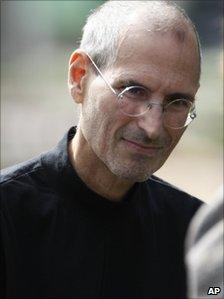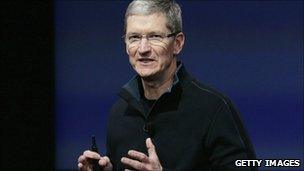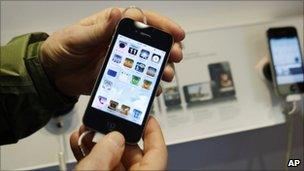Shock over Apple boss Steve Jobs' medical leave
- Published

Steve Jobs' move has raised questions over the longer-term future
News that Apple boss Steve Jobs is to take another medical leave of absence has been greeted with a mixture of sadness and shock in technology circles.
Mr Jobs, who recovered from pancreatic cancer after surgery in 2004, had a liver transplant in 2009.
Then he took time out to recover, raising questions about a line of succession at what has become the world's most successful technology company.
More than any chief executive, Mr Jobs is seen as closely tied to the success of the business he co-founded in 1976 with Steve Wozniak.
"It's a big shock and will serve as a big blow to his psyche because he loves Apple so much," said Leander Kahney, author of Inside Steve's Brain and founder of the Cult of Mac blog, external.
"Steve Jobs is the heart and soul of the company."
Industry watchers who have covered Apple for years said that given his medical condition, this latest news was perhaps to be expected.
"He hasn't looked real healthy for a while and I can't say I am totally taken off guard by the news," Van Baker, an analyst with research firm Gartner, told BBC News.
The New York Times reported that Mr Jobs had recently slowed his activities at Apple and that he had "appeared increasingly emaciated".
Apple has refused to comment beyond the statement Mr Jobs issued.
When asked about his health during a July news conference, Mr Jobs said he was "doing fine" and "feeling great".
In 2009, when Mr Jobs announced he would be taking time out, he said it would last for six months. This time around, no time scale has been given.
'Line of succession'
Apple, which has been fiercely reluctant to talk about the issue of who will eventually succeed Mr Jobs, is likely to face increased pressure on that question when the company announces its latest earnings on Tuesday.

Tim Cook stood in for Mr Jobs during his last medical leave of absence
Earlier this month, the Central Laborers' Pension Fund proposed that Apple become more open about such planning for a day when Mr Jobs will not be at the helm.
For the foreseeable future Apple's chief operating officer, Tim Cook, will step into the breach and perform the same duties he did during Mr Jobs' previous medical leave of absence.
Mr Cook has nearly 30 years of experience in the computer industry: he held leadership positions at IBM and Compaq before joining Apple.
To all intents and purposes, Mr Cook already runs Apple in his present role taking care of day-to-day responsibilities.
The last stand-in stint he carried out for his boss is a test he was seen to have passed with flying colours.
Mr Cook was awarded a special $5m (£3.1m) cash bonus in recognition of "his outstanding performance" during that time.
From 15 January 2009 until Mr Jobs' return, shares rose nearly 70%.
Future prospects
In January, the company's valuation topped $300bn as the world's third most valuable business.
"The most important thing an outsider needs to know is that when Steve is not around, Tim Cook is more than capable of running the company very effectively," said Michael Gartenberg, an analyst with Gartner.
"Tim is not some intern that just got the job. The challenge Apple faces is one they have always faced and that is finding ways to innovate products, differentiate in the marketplace and introduce products that capture the hearts and minds of the consumer," said Mr Gartenberg.
"As long as they do that, it doesn't matter who has the CEO title."
Analysts have said Apple's short- and middle-term future looks good with a "deep management bench" and a "healthy product pipeline".
Longer term is another matter.
"There is no one in this country who could replace Steve Jobs," said Charles Wolf, an analyst with Needham & Company.
"This is not just an Apple issue, it's a country issue. He's arguably the greatest innovator of the last 100 years. This is an American business loss, if he were not to return."
Plaudits for Jobs
Whatever the future holds for Mr Jobs, many agree he has left an indelible mark on technology and popular culture.
From the groundbreaking Apple II to last year's iPad tablet computer, Mr Jobs is seen as a visionary.

Steve Jobs is seen as a visionary in the technology field
One Silicon Valley editor called him the "greatest product guy Silicon Valley has ever produced", while another commentator said he was the "greatest business person alive on the planet".
Adam Engst is the founder of TidBits.com, external, covering the Macintosh community. He first met Mr Jobs at Cornell University when he was in charge of NeXT Inc, a closely watched start-up that in 1988 introduced a desktop computer targeted at the education market.
"People talked about Steve's reality distortion field as a joke but at the same time time he gives you the impression that everything he says is core to his belief about the world," he said.
"His belief then was these NeXT computers were the coolest ever built and we were going to love them. It wasn't until he left and we started working with them that we found how frustrating they were."
Mr Engst said that back then Mr Jobs dressed very differently from his trademark style today of black turtleneck sweater, blue jeans and white trainers.
"He was a huge celebrity at the time we met him and all my wife can really recall is that he had really nice shoes," said Mr Engst.
"Back in the late 1980s, he also wore a suit. I would say we were talking an expensive tailored Italian suit with leather shoes. He looked sharp."
In recognition of the news of Mr Jobs' medical leave, the creator of the spoof Fake Steve Jobs blog, external has decided to shut it down for the time being.
"This is very sad news and given that he is sick, I don't want to blog in his voice," Dan Lyons told BBC News.
Mr Lyons said he did the same thing back in 2009, when Mr Jobs last took time off to recover from his liver transplant, and will assess whether or not to revive the blog at a later date.
Mr Lyons said he had heard back in December that Mr Jobs was sick again and that this news will have taken a toll on Apple employees.
"I think people inside Apple are really upset about it. The few people I know at Apple really do love him and will have taken this news hard," said Mr Lyons.
- Published17 January 2011